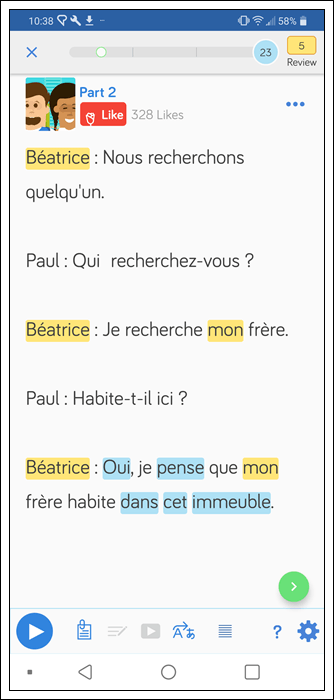A Simple Guide to French Definite Articles
As a language learner, you will have maybe noticed an “I win, or I learn” mentality in the teachings of the big personalities in the language world. In the education business, this attitude is often referred to as a growth mindset. This term was coined by professor Carol Dweck of Stanford University to describe the optimal learning attitude. When applied to second-language learning, the idea is: language learners seek out challenging situations in which to improve their skills. If those learners bring a hunger for improvement to the experience, and see challenging experiences as beneficial, then their learning snowballs.
So, how does this relate to French definite articles?
Well, I discovered that the way we learn definite articles is the prime exemplar for the growth mindset. All people, whether in France or abroad, learn definite articles the same way; through trial and error. We always view our new French skills according to how well they play in our conversations with native speakers. These other folks, thanks to human nature, generously offer the opportunity for interaction along with a healthy dose of encouragement and feedback. This means that whenever you refer to “la forêt” as “le forêt” in conversation, your partner will offer gentle correction resulting in greater odds of future correct usage. Rinse and repeat.
I am francophone, and, to this day, I still make errors with definite articles (curse you le gymnase!). It’s all about making mistakes and having the right attitude. If we stick with it, and continue to explore the outer edges of our language bubbles, we will improve. That’s how you too can learn French definite articles. In time, what seems awkward and difficult becomes natural – even effortless – and we move that language learning bar to a new level in pursuit of proficiency or fluency.
Some Basic Hacks to Learn French Definite Articles
Definite articles are known in English by the singular word “the”. In French, it comes in four forms; le (m), la (f), l’(vowel or H), and les (plural). Which one you use depends on whether the noun to which it refers is masculine or feminine, plural (more than one of something) or singular (one of something), and whether or not it starts with a vowel or the letter H. This last situation, involving nouns that begin with an H, is subject to a rare exception that you’ll eventually run in to, but it’s no big deal. Here’s a common way to break down definite articles:
| If the noun is…. | Feminine | Masculin |
| Singular | La, L’ | Le, L’ |
| Plural | Les | Les |
The word order doesn’t change in French, or anything wacky like that. So, you can drop a “le” or “la” in exactly the same place as English. Here are some examples:
| Le bébé est sous la table. | The baby is under the table. | The word bébé here is masculine and singular, so we use the appropriate form. N.B. it doesn’t matter if the baby is a girl or boy, it’s the word itself that matters. |
| Ou est la sorcière? | Where is the witch? | The witch is feminine, and there is only one of her, so we use la. |
| Les abeilles sont mortes. | The bees are dead. | It doesn’t matter that abeilles is feminine, there are lots of them so we use les. |
| Il grimpe l’arbre. | He’s climbing the tree. | The word starts with a vowel, so, L’ is the appropriate form. N.B. most nouns that start with H also get the L’ form, but there are a few exceptions for words with an H that we don’t really pronounce. You can safely save this for when you go pro. |
Fun fact: I grabbed these from an actual 1980’s French lesson!
When it comes to using French definite articles, I’ve found a few useful shortcuts. For example, words that end in “e” or “ée” are usually feminine. I call this the 80% rule, because it works about 80% of the time. The exceptions are not insignificant, and some, such as forêt and gymnase (feminine and masculine respectively), offer stiff resistance to our desire for linguistic perfection. As a second example, consider that abstract nouns that end in “-isme” such as organisme are almost always masculine.
Learning French Definite Articles in Context
There are, in fact, many more such useful rules, but I must emphasize that experience is the best teacher. Time and practice, real conversation, and reading has made me notice such patterns myself, without the help of a textbook or teacher.
LingQ has thousands of hours of great content that you can read and listen to in French. Instead of relying on your memory to know the “rules”, you can dive right into content you enjoy and use LingQ’s unique features to easily move along.

As you can see from the screen shot above, you can highlight words or sentences you don’t know and easily look them up using a variety of dictionaries, all in LingQ. You can also click the play button up top and listen to the content to help you get accustomed to the pronunciation.
LingQ’s also on mobile too.

LingQ is the best way to learn French online because it lets you learn from content you enjoy! If you’re not interested in the content LingQ provides, you can import your own.
Whether it’s a French YouTuber, popular blogs, music, and so on, you can add it into LingQ (all you need is the text, audio is a bonus.
For more information, check out these articles:
Practice Your French by Reading from These French Fashion Bloggers
Importing Your Favorite YouTube Videos into LingQ
The French language deploys definite articles in many more situations than we find them in English. That is why Francophones who speak English as a second language often drop the word “the” inappropriately. The topic is fascinating and is long enough to deserve it’s own blog posting. But, suffice to say that knowing how definite articles work plays a huge role in mastering the French language.
I’ll leave you with one piece of advice; if in doubt, just ask! It’s a myth that the French are rude when presented with amateurish use of their language. I’ve found this false over and over again. Anyone can learn a language and anyone can be kind and welcoming. The best strategies are premised on the universal truth that most people (unlike the letter H) are kind and want to help.
***
Philippe Croteau is a professional language consultant and language learner in Simcoe county, Ontario, where he lives with his great partner and two amazing daughters. He speaks French, English, Japanese, and can make a ton of mistakes in German, Russian, Hindi, Urdu, Spanish and Arabic.


